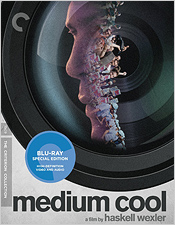Medium Cool (Blu-ray Review)

Director
Haskell WexlerRelease Date(s)
1969 (May 21, 2013)Studio(s)
Paramount Pictures (Criterion - Spine #658)- Film/Program Grade: A
- Video Grade: A+
- Audio Grade: A+
- Extras Grade: A
Review
Medium Cool was a radical and revolutionary slice of docudrama when released in 1969. A strange confluence of documentary and narrative (at least a semblance of one), the film tells the story of a rogue news cameraman (Robert Forster) caught up in the turmoil of the times in 1968. Mass media, black suppression, poverty, war and political anxiety all play a part in Haskell Wexler’s subversive masterwork.
Despite the film being dated because of the time that it takes place in, Medium Cool left a mark on other filmmakers who would go on to follow its example, whether they were serious or silly with it. There’s definitely a film nouveau influence on Medium Cool, and Robert Forster is one of the coolest cats around. It’s no wonder the film put him in on the map. He’s terrific in it, as always. The film also features the music of the Mothers of Invention, and its guerilla-like shooting style makes for some memorable images, especially considering that a lot of them were taken as historical events were actually happening in front of the camera.
My only problem with the film is that it does feel a little heavy-handed at times, and the themes that it’s tackling are a bit obvious, and they really shouldn’t be in a film where you’re mixing fact and fiction. Maybe that’s just me though, and maybe it’s just because we’re all a little more self-aware than we were in 1968. Wexler throws his characters into real events of the time and has them play off of it, but also involves real people from the time, including Martin Luther King, Jr. himself. We’re also not told everything. There are places where conventional filmmakers would have given you all of the information you needed to follow the plot, but Wexler tosses that out and focuses on what he feels is important. It can be a mixed bag for someone expecting a concrete narrative, but if you relax and open your mind to it, Medium Cool will soak you in some very vivid imagery and also give you something to think about.
Criterion’s Blu-ray release of the film features a newly “restored 4K digital film transfer, approved by director Haskell Wexler” himself, and the results are outstanding. This is, heads and tails, the best the film has ever looked, probably under any circumstance. The film’s grain structure is intact and solid throughout the proceedings, color reproduction is varied and bold, blacks are nice and deep, skin tones look great and both brightness and contrast are perfect. I also didn’t notice any signs of leftover film defects and the frame was always stable. It’s a perfect presentation, and the film’s audio soundtrack is equal to it. Despite it being an uncompressed English mono track (the film’s original soundtrack), everything is well-balanced, clear and precise. Dialogue especially is always crisp and even. Sure it lacks modern sound techniques, but it should. It’s a time capsule anyways, and it should be preserved that way in my opinion. Thankfully, Haskell Wexler feels the same way. There are also subtitles in English for those who might need them.
Extras include two audio commentaries, one with Wexler, editorial consultant Paul Golding and actor Marianna Hill, and the other with historian Paul Cronin; a new interview with Wexler; excerpts from Cronin’s making-of documentary Look Out Haskell, It’s Real!, featuring various interviews with many of the key players and then some; excerpts from Cronin’s other documentary Sooner or Later about Harold Blankenship; Medium Cool Revisited, which is a new video by Wexler about the Occupy movement’s protests against the 2012 NATO summit in Chicago; the film’s theatrical trailer; and finally, a 16-page booklet featuring a new essay by film critic and programmer Thomas Beard.
Most will call this the definitive presentation of Medium Cool I think, and rightly so. It’s virtually a perfect release of the film, thanks to Criterion and Wexler both, and it continues to remind us all that “the world is watching.” Very much recommended.
- Tim Salmons

